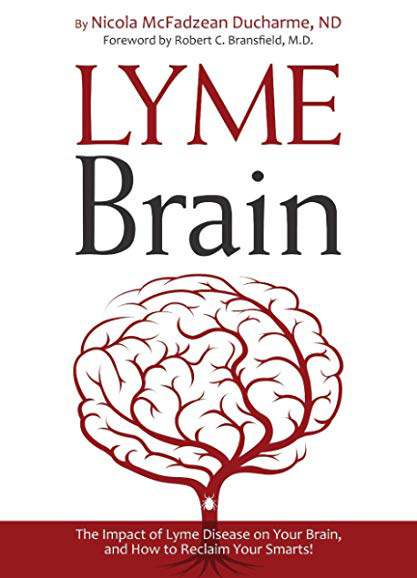TOUCHED BY LYME: “Lyme Brain” – The Impact of Lyme Disease on Your Brain

One day years ago, when my then-14 year old daughter was bedridden and desperately ill with Lyme disease, I read her two chapters of a short novel. It was a fun book, and we both laughed as I read. Then, I set it aside and made lunch.
After we’d eaten, I picked up the book and began reading where I’d left off. She stared at me curiously and asked what I was doing.
It turns out she didn’t remember ANYTHING that I’d read to her just a short time earlier! She didn’t recognize the title or cover of the book. She didn’t even recall that I’d read to her at all. It was as if that earlier time hadn’t happened. It was a weird and scary episode. Was my young teenager losing her mind?
That was my introduction to the concept of Lyme brain.
Symptoms of Lyme Brain
It’s a constellation of symptoms that can include short-term memory loss, difficulty with focus and concentration, and other assorted neurocognitive factors. It can be accompanied by anxiety and depression.
Lyme brain is a big concern in the patient community, and people often post about it in the online Lyme forums. There are stories of getting lost on the way to the grocery store, or being incapable of making change for a $10 bill, or being unable to keep track of medications. Individuals who once were highly skilled at their jobs may find themselves flummoxed by simple tasks.
Nicola McFadzean Ducharme, ND, has written a book specifically for such people. It’s called Lyme Brain: The Impact of Lyme Disease on Your Brain, and How to Reclaim Your Smarts.
(She’s also the author of The Lyme Diet: Nutritional Strategies for Healing from Lyme Disease, The Beginner’s Guide to Lyme Disease, and Lyme Disease in Australia. They all offer solid, practical information for patients.)
Lyme disease effects on the brain

Ducharme lays all this out in plain language. She also explains how co-infections contribute to Lyme disease brain:
One of the reasons I believe that the actual brain fog, memory issues and difficulty with focus and concentration is Borrelia [Lyme]driven is because when I treat my patients with medications that primarily impact Borrelia and cross the blood-brain barrier, I see these symptoms improve, whereas the insomnia and wacky dreams tend to respond more to Babesia treatment. Really extreme psychiatric symptoms such as rages, and suicidal thoughts and behaviors, respond mostly to Bartonella treatment.
Treatment for neurological Lyme disease
After defining the problem, she moves on to solutions. The next section deals with pharmaceutical approaches to Lyme disease in the brain, including an explanation of the blood-brain barrier and what drugs can effectively penetrate it. She discusses medications that reduce inflammation, as well as those to stabilize neurological function, balance mood and help people think more clearly.
Section 3 discusses natural approaches to Lyme disease in the brain: antimicrobials, such as Cat’s Claw and teasel root; anti-inflammatories, such as curcumin and stephania root; antioxidants, such as glutathione; neurotransmitter support; and essential oils such as peppermint and frankincense.
Section 4 deals with nutrition. Readers of her earlier book, The Lyme Diet, will find familiar themes: avoid gluten, dairy, sugar, caffeine, alcohol and additives such as MSG. (Those are highlights. There is much more discussion of the topic.)
Ducharme explains about therapies to help the brain, including neurofeedback, “Brainwave Entrainment,” and hyperbaric oxygen. She covers sleep and exercise. She reviews different kinds of psychotherapy for patients with Lyme brain.
Insights on neurological Lyme disease
She rounds out her discussion of these issues by interviewing five professionals who know a lot about neurological Lyme disease. One is psychiatrist Robert Bransfield, MD, a top expert on how Lyme affects the brain (and who also wrote the foreword to this book). Another is Sandra Berenbaum, LCSW, with whom I co-authored the book When Your Child Has Lyme Disease: A Parent’s Survival Guide. Others are Leo Shea, Ph.D., who has extensive experience with neuropsychological testing of children and adults with Lyme disease; health advocate/blogger Scott Forsgren, founder of BetterHealthGuy.com, who writes extensively on Lyme-related issues; and Connie Strasheim, author of many books about Lyme disease. They all offer useful insights on the topic of Lyme disease brain.
Throughout the book, Ducharme offers practical information with a strong helping of optimism. As she writes early on:
I find that the majority of people with Lyme brain can find resolution or, at the very least, significant improvement of their symptoms….I’m not saying it’s quick or easy, but I have seen remarkable improvements in people who started out very, very ill with horrible Lyme brain and are now back at work, running their families and living their lives as productive, happy people.
If you or a loved one has a problem with neurological Lyme disease symptoms, I think you’ll find this book both helpful and hopeful.
TOUCHED BY LYME is written by Dorothy Kupcha Leland, LymeDisease.org’s VP for Education and Outreach. She is co-author of When Your Child Has Lyme Disease: A Parent’s Survival Guide. Contact her at dleland@lymedisease.org.




















We invite you to comment on our Facebook page.
Visit LymeDisease.org Facebook Page